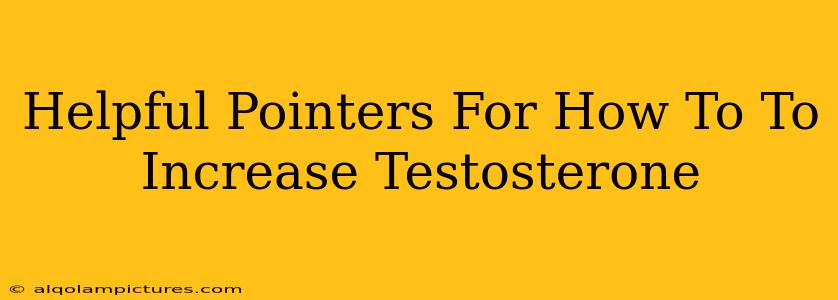Low testosterone can significantly impact a man's physical and mental well-being. If you're concerned about your testosterone levels, it's crucial to consult a doctor for proper diagnosis and guidance. However, alongside medical advice, several lifestyle changes can help boost your testosterone naturally. This article explores helpful pointers to increase testosterone levels safely and effectively.
Lifestyle Changes to Naturally Boost Testosterone
Several lifestyle modifications can positively influence your testosterone production. These aren't quick fixes, but consistent effort yields results.
1. Prioritize Strength Training:
Strength training is arguably the most effective way to naturally increase testosterone. Lifting weights stimulates muscle growth, triggering a hormonal response that increases testosterone production.
- Focus on compound exercises: Squats, deadlifts, bench presses, and overhead presses are excellent choices as they work multiple muscle groups simultaneously.
- Maintain proper form: Incorrect form can lead to injuries, hindering your progress. Consider working with a trainer initially to learn correct techniques.
- Progressive overload: Gradually increase the weight, reps, or sets over time to continually challenge your muscles and promote growth.
2. Get Enough Sleep:
Sleep deprivation drastically reduces testosterone levels. Aim for 7-9 hours of quality sleep each night. Establish a regular sleep schedule, create a relaxing bedtime routine, and optimize your sleep environment for darkness and quiet.
3. Manage Stress Levels:
Chronic stress elevates cortisol levels, a hormone that suppresses testosterone production. Employ stress-reducing techniques like:
- Meditation: Regular meditation can significantly reduce stress and anxiety.
- Yoga: Yoga combines physical postures, breathing techniques, and meditation to promote relaxation.
- Spending time in nature: Studies show that spending time outdoors can lower stress levels.
4. Maintain a Healthy Diet:
Nutrition plays a crucial role in hormone regulation. Focus on a diet rich in:
- Lean protein: Essential for muscle growth and testosterone production. Good sources include chicken, fish, and lean beef.
- Healthy fats: Avoid trans fats and limit saturated fats. Include sources like avocados, nuts, and olive oil.
- Complex carbohydrates: Provide sustained energy for workouts and overall health. Choose whole grains, fruits, and vegetables.
- Limit processed foods and sugar: These can negatively impact hormone balance.
5. Consider Vitamin D Levels:
Vitamin D deficiency is linked to lower testosterone. Ensure you're getting enough sunlight or consider supplementation after consulting your doctor. They can run a blood test to assess your Vitamin D levels and provide personalized recommendations.
6. Limit Alcohol Consumption:
Excessive alcohol intake can significantly impair testosterone production. Moderate your alcohol consumption or abstain entirely.
When to Consult a Doctor
While lifestyle changes can significantly impact testosterone levels, it's crucial to consult a doctor if you suspect low testosterone. They can perform blood tests to determine your levels and rule out any underlying medical conditions. Self-treating can be dangerous, so professional medical advice is essential.
Boosting Testosterone: A Holistic Approach
Increasing testosterone naturally requires a holistic approach that encompasses strength training, sufficient sleep, stress management, a healthy diet, and mindful lifestyle choices. While supplements are often marketed, it's always best to prioritize lifestyle changes and consult a medical professional before considering any supplements. Remember consistency is key; the benefits of these changes accumulate over time. By making these changes and partnering with your doctor, you can effectively manage your testosterone levels and improve your overall well-being.

